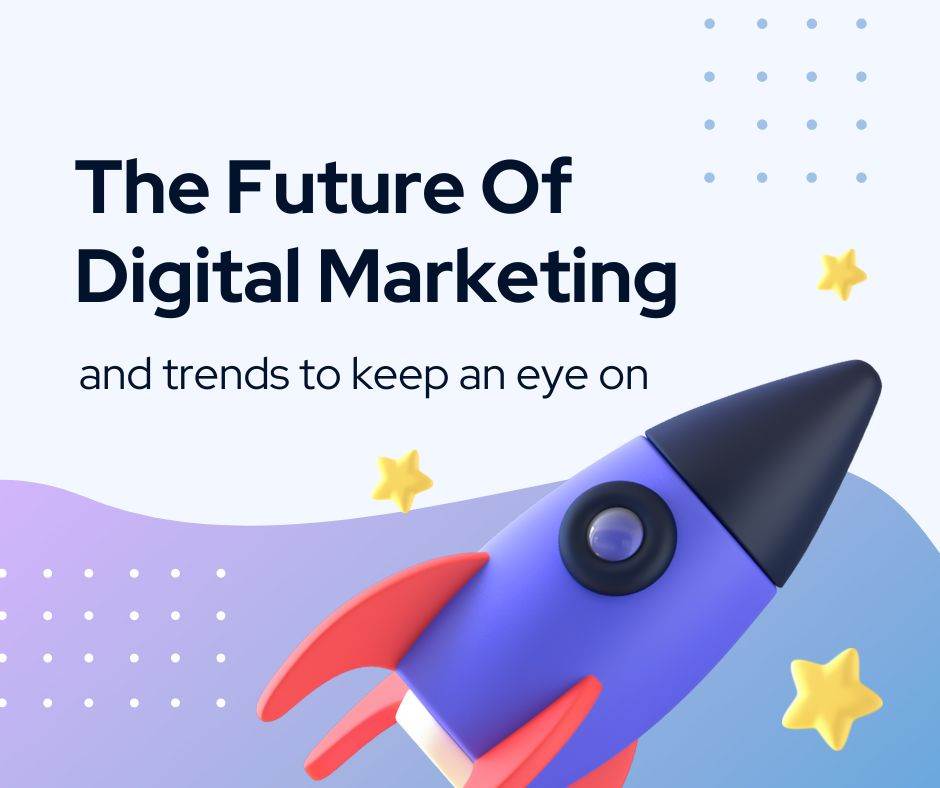
Digital marketing is constantly evolving and adapting to new technologies and trends. In the past few years, we have seen the rise of social media, mobile devices, and artificial intelligence, all of which have had a significant impact on the way businesses market their products and services.
As we look toward the future, it’s clear that digital marketing will continue to play a vital role in the success of businesses. In this blog post, we will explore some of the key trends and technologies that are shaping the future of digital marketing.
Artificial intelligence
Artificial intelligence (AI) is one of the most transformative technologies of our time, and it is set to revolutionize how we do business. AI has the potential to automate many tasks, including content creation, customer service, and data analysis, which will allow businesses to focus on more important tasks.
One of the key ways that AI will impact digital marketing is through personalized marketing. Using machine learning algorithms, businesses will be able to analyze customer data and create personalized marketing campaigns that are tailored to each individual customer. This will enable businesses to deliver more relevant and engaging content, increasing customer loyalty and sales.
Another area where AI will have a significant impact is voice search optimization. With the rise of voice assistants like Amazon Echo and Google Home, more and more people are using voice search to find products and services. AI will be able to analyze customer data and optimize content for voice search, making it easier for businesses to be found by potential customers.
Virtual and augmented reality
Virtual reality (VR) and augmented reality (AR) allow users to experience immersive digital environments. VR provides a fully immersive experience, while AR overlays digital elements in the real world.
Both VR and AR have the potential to revolutionize the way businesses market their products and services. For example, businesses could use VR to create immersive product demonstrations that allow customers to try out products in a virtual environment. This could be particularly useful for products that are difficult to demonstrate in a physical store, such as furniture or home appliances.
AR, on the other hand, could be used to create interactive marketing experiences. For example, businesses could create AR campaigns that allow customers to see how products would look in their own homes or to explore virtual environments that are relevant to their interests.
Chatbots
Chatbots are computer programs that use artificial intelligence to simulate conversations with human users. They are increasingly being used by businesses to provide customer service, answer questions, and provide information.
One of the key benefits of chatbots is that they are available 24/7, so customers can get help and support whenever needed. This is particularly useful for businesses that operate in different time zones, as chatbots can provide support to customers in different parts of the world.
Another benefit of chatbots is that they can handle multiple conversations at once, which means that businesses can provide support to a larger number of customers without having to hire additional staff. This can save businesses time and money and allow them to focus on more critical tasks.
Video Marketing
Video marketing is a powerful tool businesses can use to engage with customers and promote their products and services. According to a study by Hubspot, video is the most popular form of content on social media, and it is expected to account for 80% of all internet traffic by 2021.
One of the key trends in video marketing is live streaming, which allows businesses to connect with their customers in real time. Live streaming is particularly popular on platforms like TikTok Live, Facebook Live and Instagram Live, and it allows businesses to show their products and services in action and connect with customers in a more authentic and personal way.
Another trend in video marketing is animated videos, which can be used to explain complex concepts or products simply and engagingly. Animated videos are particularly effective at capturing viewers’ attention, and they are often shared more widely on social media than traditional videos.
Social media marketing
Social media is an essential tool for businesses looking to reach and engage with their customers. We expect to see more businesses using social media to create personalized marketing campaigns tailored to individual customers.
One of the key trends in social media marketing is influencer marketing, which involves businesses partnering with popular social media users to promote their products and services. Influencer marketing is particularly effective at reaching younger audiences, and it can be a powerful way for businesses to build trust and credibility with their customers.
Another trend in social media marketing is the use of micro-moments, small, fleeting moments when people use their mobile devices to seek information or make a decision. Businesses can use micro-moments to reach their customers with relevant and timely messages, helping them to make a purchase decision.
Personalization
Personalization is tailoring marketing campaigns to the specific needs and interests of individual customers. In the future, we expect to see more businesses using data and technology to create personalized marketing campaigns that are relevant and engaging to their customers.
One way that businesses can personalize their marketing is through the use of customer data, which can be used to create targeted marketing campaigns that are relevant to individual customers. For example, businesses can use customer data to create personalized email campaigns or targeted ads on social media.
Another way that businesses can personalize their marketing is through the use of personalization algorithms, which can analyze customer data and create personalized recommendations or content based on individual interests and needs. Personalization algorithms are particularly effective at increasing customer engagement and loyalty, as they provide customers with content that is relevant and personalized to them.
Content marketing
Content marketing is creating and sharing valuable, relevant, and consistent content to attract and retain a clearly defined audience. In the future, we expect to see more businesses using content marketing to engage with their customers and build trust and credibility.
One trend in content marketing is the use of video, which is an effective way to capture the attention of viewers and engage with customers. Video content can showcase products and services, explain complex concepts, or provide entertainment value.
Another trend in content marketing is the use of interactive content, which allows customers to engage with a brand in a more meaningful way. Interactive content can include quizzes, surveys, or interactive infographics, and it can be an effective way to build customer loyalty and engagement.
Conclusion
Digital marketing is constantly evolving, and it’s clear that the future will be shaped by various trends and technologies. From artificial intelligence and virtual reality to social media marketing and personalization, businesses will need to stay up to date with the latest developments to stay ahead of the curve. By staying on top of these trends, businesses will be able to create more effective and engaging marketing campaigns and connect with their customers in a more meaningful way.














